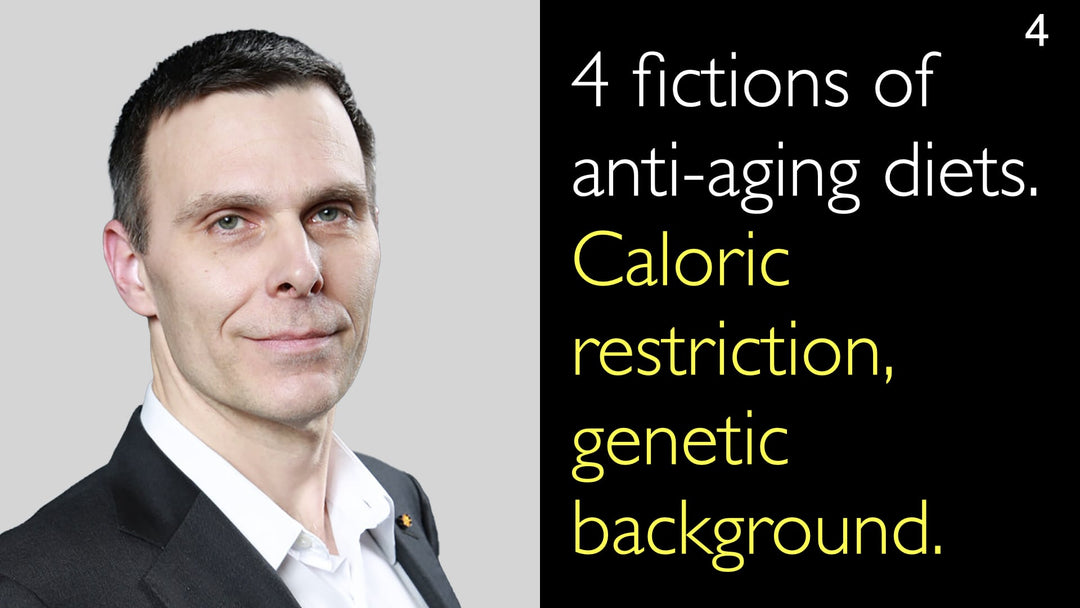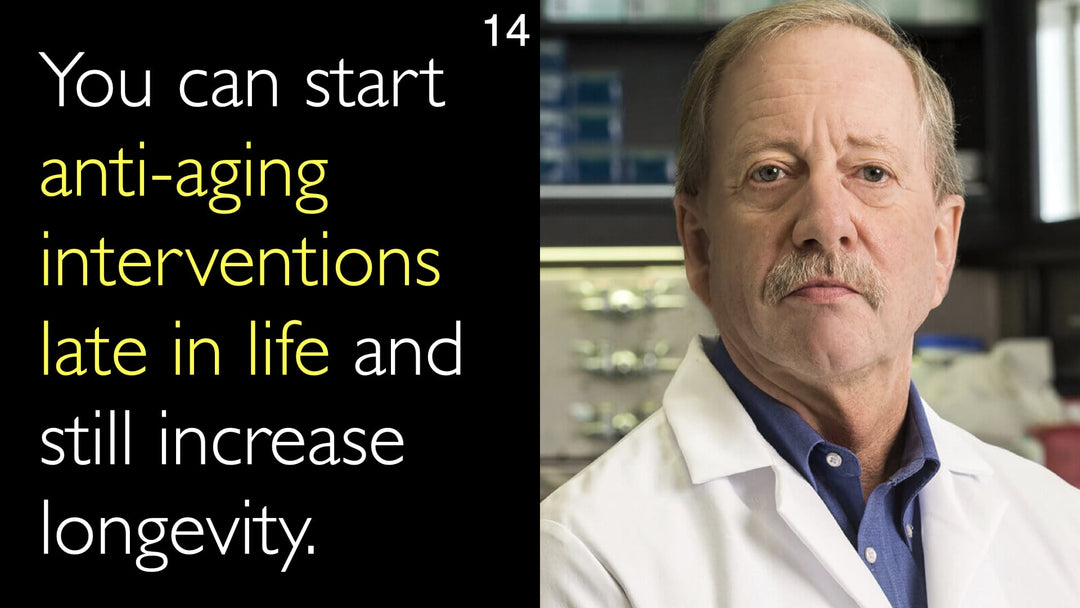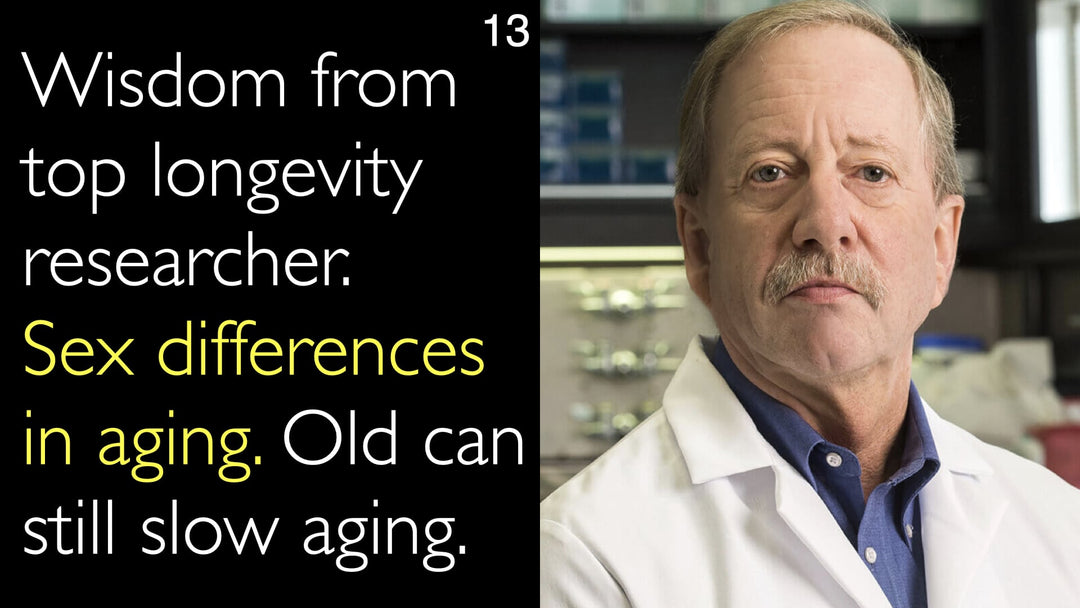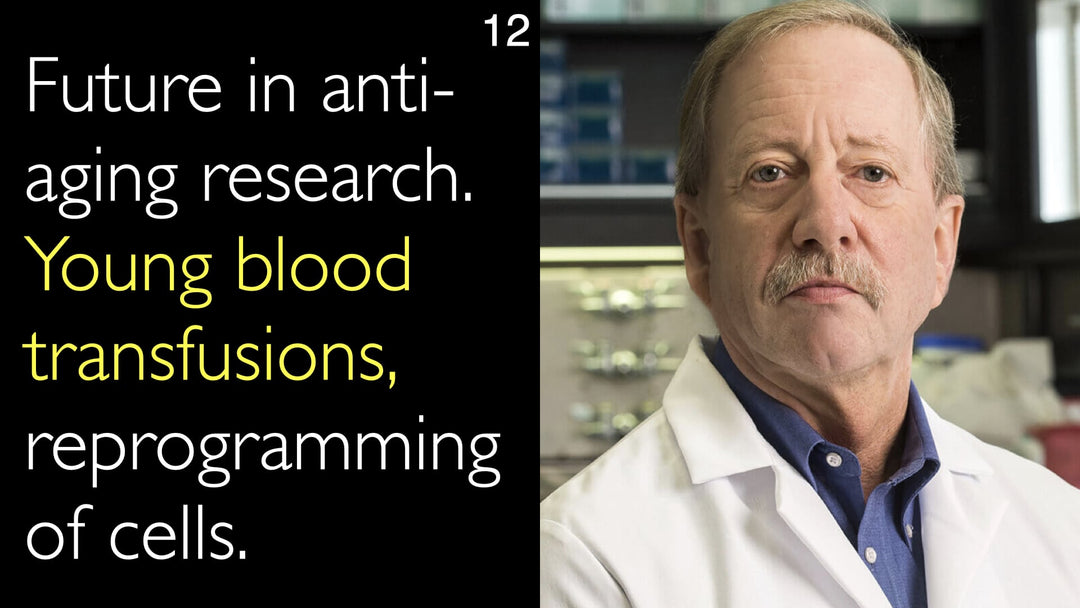Dr. Matt Kaeberlein, MD, ein führender Experte für Alternsbiologie, klärt über die vier größten Mythen von Anti-Aging-Diäten auf. Er betont, dass Kalorienrestriktion nicht in jedem Fall die Lebensspanne verlängert. Der genetische Hintergrund ist entscheidend für das Ansprechen auf Ernährungsinterventionen. Laborergebnisse von Inzuchttieren lassen sich oft nicht direkt auf genetisch diverse Menschen übertragen. Dr. Kaeberlein unterstreicht die Notwendigkeit personalisierter Ansätze und weiterer Forschung.
Entlarvung gängiger Mythen über Anti-Aging-Diäten und Kalorienrestriktion
Direkt zum Abschnitt
- Anti-Aging-Diäten sind nicht alle gleich
- Kalorienrestriktion wirkt nicht immer
- Genetischer Hintergrund beeinflusst die Diätantwort
- Laborergebnisse gelten nicht direkt für Menschen
- Notwendigkeit eines personalisierten Medizinansatzes
- Zukünftige Forschung in der Altersbiologie
- Vollständiges Transkript
Anti-Aging-Diäten sind nicht alle gleich
Ein weit verbreiteter Irrglaube in der Anti-Aging-Ernährung ist, dass alle Diäten gleich wirken. Dr. Matt Kaeberlein, MD, stellt klar, dass beliebte Ansätze wie Kalorienrestriktion, intermittierendes Fasten und zeitlich begrenzte Nahrungsaufnahme nicht austauschbar sind. Diese Diäten können über unterschiedliche biologische Signalwege auf den Alterungsprozess einwirken. Ihre Wirksamkeit variiert erheblich je nach Individuum und spezifischem Ernährungskontext.
Kalorienrestriktion wirkt nicht immer
Kalorienrestriktion wird oft als universelles Mittel zur Lebensverlängerung angepriesen. Dr. Matt Kaeberlein, MD, entlarvt dies als entscheidenden Mythos. Er weist darauf hin, dass etwa ein Drittel der genetischen Hintergründe in Modellorganismen keinen Nutzen aus Kalorienrestriktion zieht. In manchen Fällen kann eine Kalorienreduktion sogar die Lebensdauer verkürzen. Dies zeigt, dass die Methode keine garantierte Anti-Aging-Lösung für jeden darstellt.
Genetischer Hintergrund beeinflusst die Diätantwort
Die individuelle genetische Ausstattung ist ein Hauptfaktor für das Ansprechen auf eine Anti-Aging-Diät. Forschungen an Hefe, Fruchtfliegen und Mäusen zeigen deutliche Unterschiede in den Ergebnissen je nach Genetik. Dr. Matt Kaeberlein, MD, erläutert, dass diese genetische Variabilität bedeutet: Eine für eine Person vorteilhafte Diät könnte für eine andere neutral oder sogar schädlich sein. Diese Komplexität unterstreicht, warum personalisierte Ernährung für wirksame Anti-Aging-Interventionen entscheidend ist.
Laborergebnisse gelten nicht direkt für Menschen
Die meisten Daten zu Anti-Aging-Diäten stammen aus hochkontrollierten Laborexperimenten mit Inzuchttieren. Dr. Matt Kaeberlein, MD, warnt davor, diese Ergebnisse direkt auf Menschen zu übertragen. Menschen weisen eine immense genetische und epigenetische Vielfalt auf, die in homogenen Laborgruppen fehlt. Diese Diversität macht es äußerst schwierig, die individuelle Reaktion auf Kalorienrestriktion oder andere diätetische Interventionen für Langlebigkeit vorherzusagen.
Notwendigkeit eines personalisierten Medizinansatzes
Das derzeit fehlende mechanistische Verständnis erfordert einen personalisierten Ansatz für Anti-Aging-Diäten. Dr. Kaeberlein betont, dass wir noch nicht vorhersagen können, wer von Kalorienrestriktion profitieren wird. Ohne Kenntnis des spezifischen genetischen Hintergrunds einer Person ist die Empfehlung einer Einheitsdiät potenziell riskant. Die Zukunft der Anti-Aging-Ernährung liegt in maßgeschneiderten Strategien, die auf der individuellen Biologie basieren.
Zukünftige Forschung in der Altersbiologie
Erhebliche Forschungsarbeit ist nötig, um von Hype zu evidenzbasierter Praxis bei Anti-Aging-Diäten zu gelangen. Dr. Matt Kaeberlein, MD, unterstreicht die Notwendigkeit, das komplexe Zusammenspiel zwischen Genen und Ernährung zu verstehen. Seine in der Zeitschrift Science veröffentlichte Arbeit fordert rigorosere Studien in diversen Populationen. Das Ziel ist die Entwicklung zuverlässiger, personalisierter Ernährungsempfehlungen zur Förderung von Gesundheitspanne und Langlebigkeit.
Vollständiges Transkript
Dr. Anton Titov, MD: In einem Gespräch mit Dr. Anton Titov erörtert Dr. Matt Kaeberlein, ein führender Forscher in der Altersbiologie, die großen Missverständnisse – oder "Mythen" – rund um Anti-Aging-Diäten.
Dr. Matt Kaeberlein, MD: Gestützt auf seinen Übersichtsartikel in der Zeitschrift Science betont Dr. Kaeberlein die Notwendigkeit, populäre Annahmen über diätetische Interventionen wie Kalorienrestriktion, intermittierendes Fasten und zeitlich begrenzte Nahrungsaufnahme kritisch zu bewerten.
Dr. Anton Titov, MD: Eines der häufigsten Missverständnisse ist, dass alle Anti-Aging-Diäten auf die gleiche Weise wirken oder austauschbar sind.
Dr. Matt Kaeberlein, MD: Die Vorstellung, dass Anti-Aging-Diäten alle gleich sind, muss widerlegt werden. Unterschiedliche Diäten können über unterschiedliche biologische Signalwege wirken, und ihre Wirksamkeit kann je nach Individuum und Kontext erheblich variieren.
Dr. Anton Titov, MD: Ein sehr verbreiteter Irrtum ist, dass Kalorienrestriktion immer wirkt.
Dr. Matt Kaeberlein, MD: Obwohl Kalorienrestriktion in vielen Laborexperimenten – insbesondere bei genetisch identischen Tieren – die Lebensdauer verlängert hat, ist das Bild in genetisch diversen Populationen differenzierter. Studien an Hefe, Fruchtfliegen und Mäusen haben gezeigt, dass etwa ein Drittel der genetischen Hintergründe überhaupt nicht von Kalorienrestriktion profitiert. In manchen Fällen kann sie sogar die Lebensdauer verkürzen.
Dies zeigt, dass Kalorienrestriktion nicht universell vorteilhaft ist.
Dr. Anton Titov, MD: Die meisten Experimente zur Kalorienrestriktion werden an genetisch homogenen Tieren unter streng kontrollierten Laborbedingungen durchgeführt.
Dr. Matt Kaeberlein, MD: Das ist nützlich, um Variationen zu kontrollieren, aber man könnte übersehen, dass ein anderer genetischer Hintergrund möglicherweise nicht den gleichen Effekt zeigt. Menschen sind im Gegensatz dazu genetisch und epigenetisch divers. Diese Variabilität macht es weitaus komplexer vorherzusagen, wie ein bestimmtes Individuum auf eine Anti-Aging-Diät ansprechen wird.
Dr. Anton Titov, MD: Ein weiterer Mythos ist, dass Kalorienrestriktion keine Risiken birgt.
Dr. Matt Kaeberlein, MD: Während sie bei bestimmten Personen Vorteile bieten kann, könnte sie bei anderen neutral – oder sogar schädlich – sein. Wir haben fast kein mechanistisches Verständnis dieser Wechselwirkung zwischen Genotyp und Ansprechen auf Kalorienrestriktion. Dies wirft einen wichtigen Punkt auf: Ohne Kenntnis des spezifischen genetischen oder epigenetischen Hintergrunds eines Individuums ist es schwierig vorherzusagen, ob Kalorienrestriktion nützt oder schadet.
Die personalisierte Medizin hat mit der Komplexität diätetischer Anti-Aging-Interventionen noch nicht Schritt gehalten.
Dr. Anton Titov, MD: Anti-Aging-Diäten sind nicht für alle gleich geeignet.
Dr. Matt Kaeberlein, MD: Während Strategien wie Kalorienrestriktion und zeitlich begrenzte Nahrungsaufnahme vielversprechend sind, variieren ihre Effekte stark zwischen verschiedenen genetischen Hintergründen. Sie wirken nicht immer. Weitere Forschung ist notwendig, um das komplexe Zusammenspiel zwischen Genen und Ernährung in der Altersbiologie zu verstehen und von Hype zu evidenzbasierter Praxis zu gelangen.







